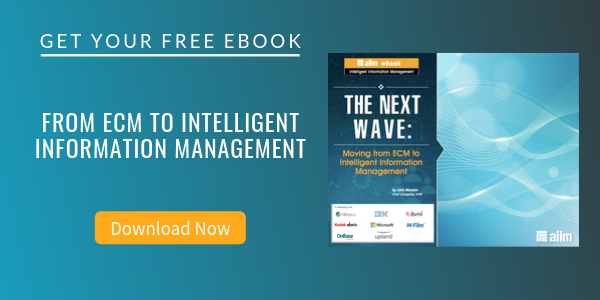
8 Things to Consider When Looking at ECM Consultants
Enterprise Content Management (ECM)
Content Management outsourcing is gaining popularity due to the various options that are available to those who are seeking assistance - such as project-based consulting or staff augmentation.
The outsourcing model offers access to skills, experience, and resources that many organizations would not otherwise be able to obtain due to the financial commitment required to recruit, hire, and train these specific proficiencies in-house. However, selecting the partner who can best meet your needs is not always as easy as you might think. The following considerations should be taken into account when assessing the outsourcing talent pool:
-
Experience
You certainly don’t want your chosen provider to “cut their teeth” on your application. Thoroughly researching the four points below will provide you “peace of mind” as you embark on your project.
- Experience in your industry or vertical market?
- Experience with your specific issue(s) or pain point(s)?
- Experience with your specific IT technology/product set(s) such as database and operating system
- Multiple references – successful with implementations of similar size and scope?
-
Proven methodologies
It's not uncommon to ask to see representative examples of previous project or communication plans. Additionally, your company has standards and methodologies that have been critical to your success. Will your outsource partner incorporate the good things that you typically like to include that have made previous endeavors successful in the past? Be sure to ask about:
- Project charter – initiation or creation of the project
- Project plan – Scheduling, resources, and commitments
- Project status update – recurring, dependable communication plan
- Change order – predefined process to manage scope creep
- Mutual Sign-off upon successful project completion
-
Ability to deliver the proposed scope on time/on budget
Unfortunately, too many consultants come in and identify the problem, present a solution, but don’t stay until completion or finish the job. As best as possible, identify costs upfront – both initial and on-going.
-
Stability and financial strength
Stability and financial strength are even more crucial with a specialized solution. Also, consider whether your chosen provider would be willing and able to help you become self-sufficient once the project has been completed? Please explore the following:
- Will the chosen provider be around for the long term to support your solution or application?
- Will they offer a Service Level Agreement with multiple support options (standard support, after-hours support, etc.)
- Will they provide end-user and administrator training?
- Will they extend the current application (additional features/functionality) or create an entirely new application if/when requirements change?
- Has their staff been employed by the company for some time?
- Do they cross-train so that more than one employee is familiar with your solution?
-
Industry Reputation
A good reputation within your industry or vertical market gives you confidence that your chosen provider better understands the issues you are facing.
- Have they won industry awards?
- Do they participate in industry conferences?
- Are they active in the online community?
-
Reputation and Relationship with Software Manufacturer
Assuming that your chosen provider is not the software manufacturer, are they “in the trenches” with the manufacturer? Do they participate in alpha or beta testing of new product releases? Do they know the short and long term product roadmap? Find out the following:
- Is the staff certified?
- Are the certifications current?
- Do they have relationships at various levels with the manufacturer (executive? product management? product development?)
- Are they a member of a Partner Advisory Council?
-
Comprehensive Documentation
Ask for representative examples to make sure the documentation will suffice and truly be a valuable resource when issues arise. Will the documentation that is provided at the end of the project detail your specific solution? When shown previous examples, ask to be pointed to solution specific portions of the documentation. Watch out for “boiler-plate” style examples.
-
Good “fit” for your organization?
This is often unnecessarily overlooked. Are the people that you are talking to in a “pre-sales” capacity the same staff that will be assigned to your project? If not, ask to meet the project team. An area that is often overlooked is the culture compatibility with your own organization. This is very important if you desire to develop a long term, lasting partnership.
Outsourcing can be a wonderful alternative during times when maintaining budgets are more important than ever. If you select a competent partner, you will gain invaluable access to a wealth of skills, knowledge, and experience on-demand at a lower cost than it would typically cost for you to recruit, hire and train your own staff. Remember to seek a partner for the long term. Best of luck!
About John Mancini
John Mancini is the President of Content Results, LLC and the Past President of AIIM. He is a well-known author, speaker, and advisor on information management, digital transformation and intelligent automation. John is a frequent keynote speaker and author of more than 30 eBooks on a variety of topics. He can be found on Twitter, LinkedIn and Facebook as jmancini77. Recent keynote topics include: The Stairway to Digital Transformation Navigating Disruptive Waters — 4 Things You Need to Know to Build Your Digital Transformation Strategy Getting Ahead of the Digital Transformation Curve Viewing Information Management Through a New Lens Digital Disruption: 6 Strategies to Avoid Being “Blockbustered” Specialties: Keynote speaker and writer on AI, RPA, intelligent Information Management, Intelligent Automation and Digital Transformation. Consensus-building with Boards to create strategic focus, action, and accountability. Extensive public speaking and public relations work Conversant and experienced in major technology issues and trends. Expert on inbound and content marketing, particularly in an association environment and on the Hubspot platform. John is a Phi Beta Kappa graduate of the College of William and Mary, and holds an M.A. in Public Policy from the Woodrow Wilson School at Princeton University.



